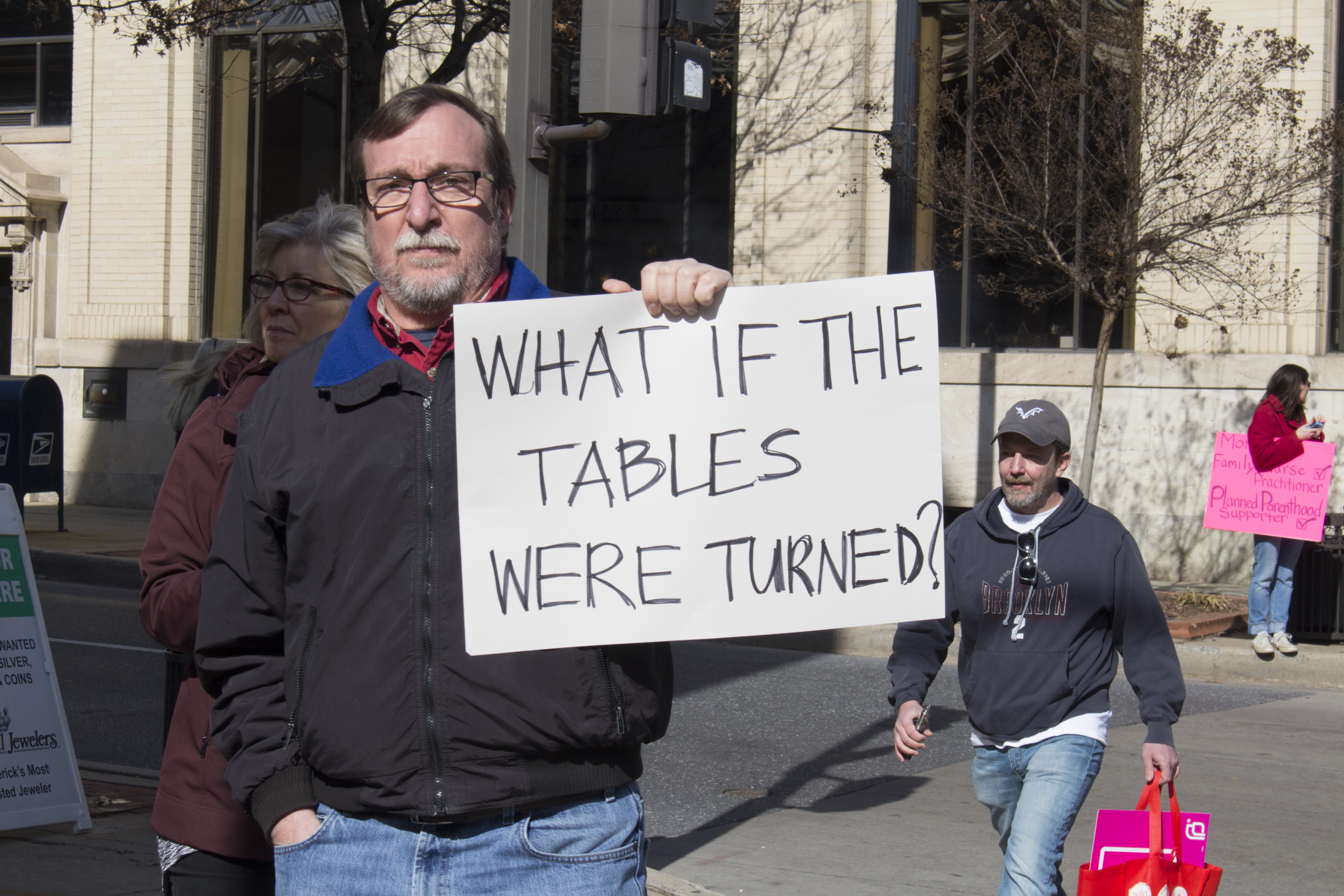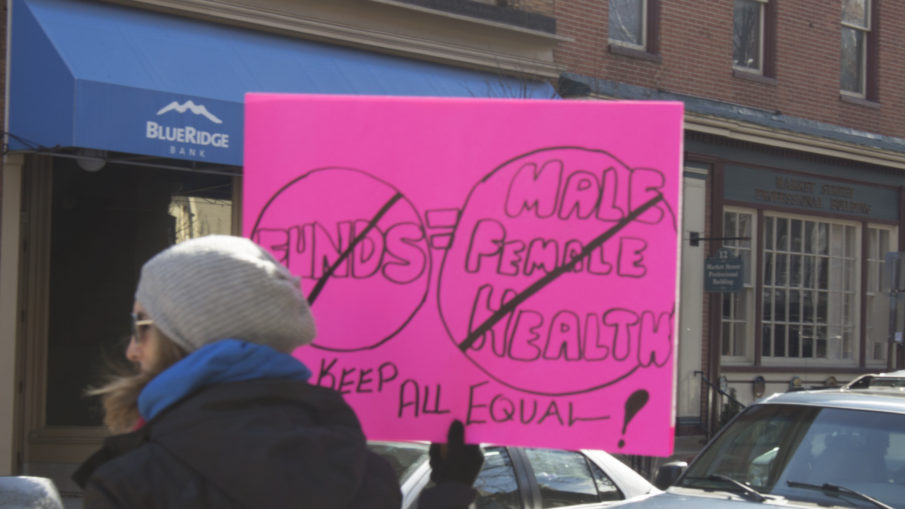Protesters met peacefully in Downtown Frederick on Feb. 11 to resist proposed federal defunding of Planned Parenthood, demonstrate visible public support for Roe v. Wade, and advocate on behalf of women’s rights and increased access to health care options.
Planned Parenthood supporters crowded all four corners of Market and Patrick St. at 11 a.m. They carried signs, chanted, and encouraged cars to, according to one poster, “Honk If You Support Reproductive Choice.”
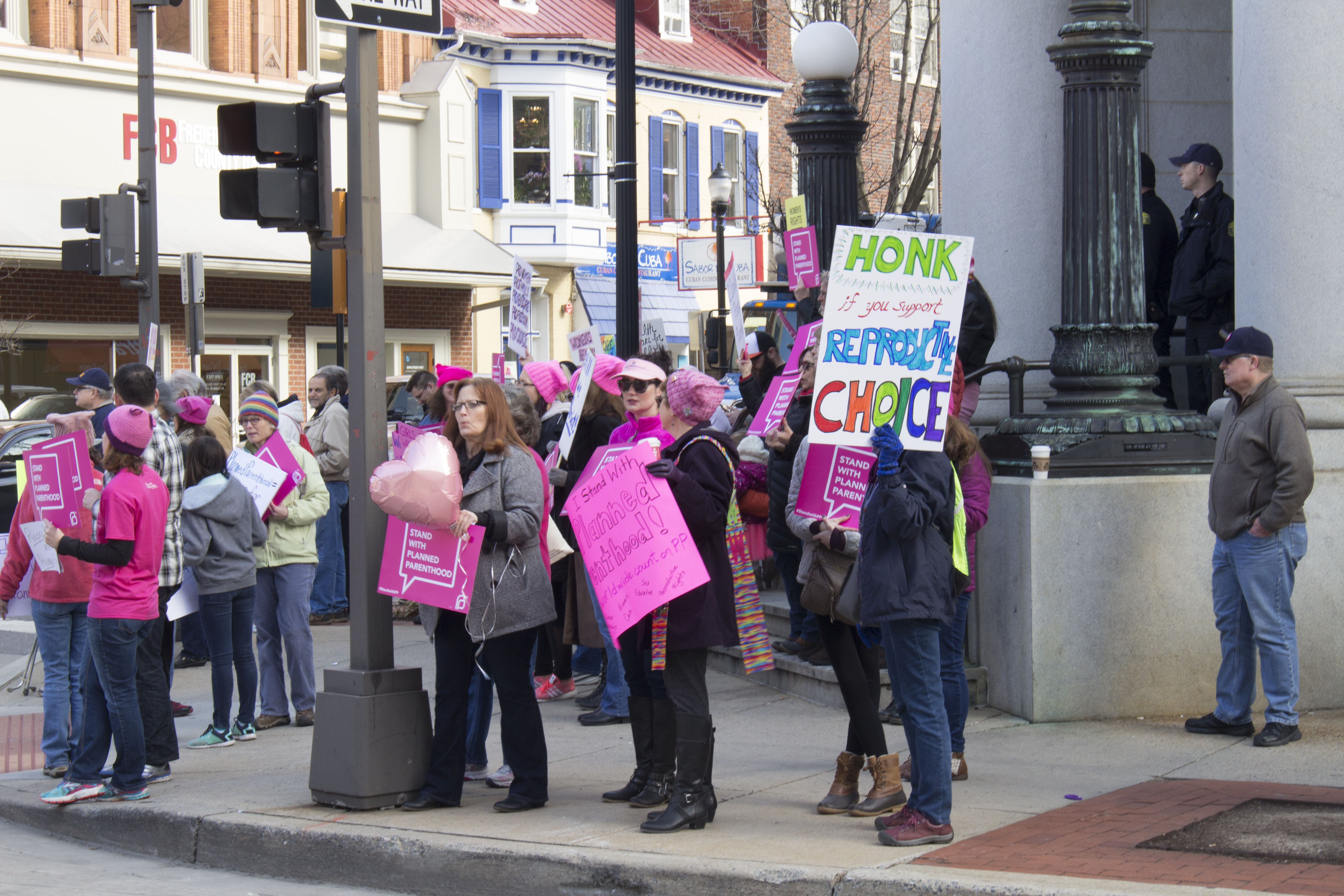
Some protesters were clad in the pink knit hats which have proliferated since the women’s marches in January, and most held signs, many of them handmade. The majority contained brief messages such as, “Keep Abortion Legal” and “Keep Birth Control Legal.” Some signs, however, were emblazoned with such slogans as, “Planned Parenthood: Service for People with Low Income,” “This Christian Says Thank God for Planned Parenthood,” and “Because Even Women and Sick People Should Have Health Care.”
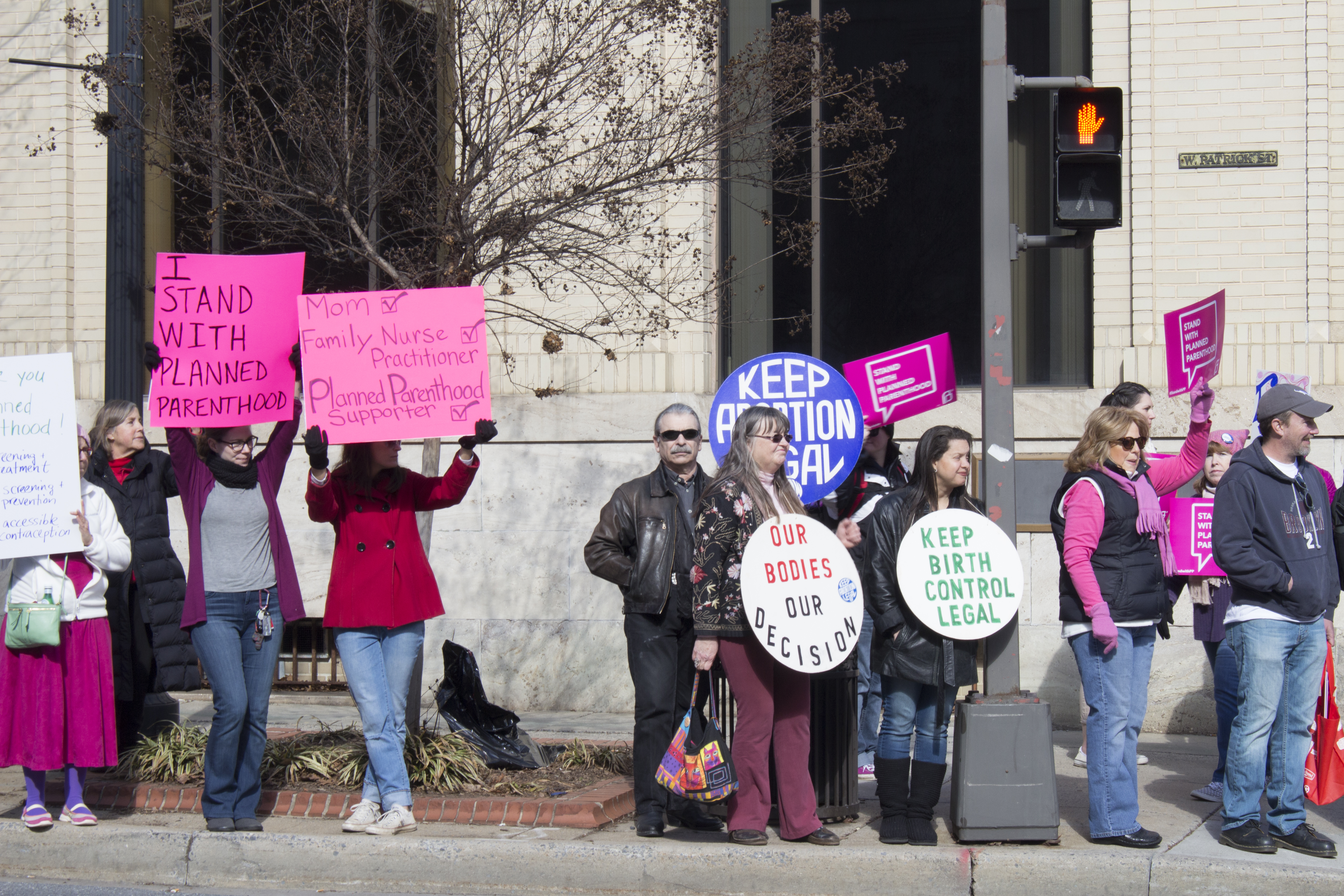
The Frederick event was organized by Bethel Quick and others amid controversy after Speaker of the House Paul Ryan announced Jan. 5 that Republicans intended to include a provision to cut all federal funding for Planned Parenthood in the budget reconciliation dismantling Obamacare.
Similar legislation was passed in Congress last year, but was vetoed by President Obama.
Speaker Paul Ryan’s recent announcement of proposed funding cuts sparked renewed tensions. Protests erupted both advocating for and against continued funding of the 100-year-old nonprofit organization.
The primary function of Planned Parenthood is to offer reproductive healthcare, according to their website. The services offered by Planned Parenthood include pregnancy tests, birth control, cancer screenings, STI testing and treatment, and information and other resources covering sexual and reproductive health topics, according to their website and annual report. 3 percent of their services are abortion-related.
Planned Parenthood receives 43 percent, or $528 million, of its annual $1 billion budget from the federal government, according to its most recent annual report, dated 2014-15. Therefore, GOP threats to defund the nonprofit could pose a legitimate threat to the institution’s ability to remain financially viable without those revenue sources.
Planned Parenthood receives its federal funding in two forms: Title X and Medicaid.
Title X of the Public Health Service Act refers to federal grants for family planning services through the Family Planning Program. Title X funds are not allowed to be used for abortions.
Medicaid is the other source of Planned Parenthood’s federal funds. Medicaid is a state and federal program that provides health coverage for very low income individuals. The 1977 Hyde Amendment forbids low-income women from receiving abortions through Medicaid, though Congress has made a couple of exceptions to the funding ban. Currently the only exceptions are in cases of rape or incest, or when a pregnant woman’s life is endangered by the pregnancy, according to the Medicaid.gov website.
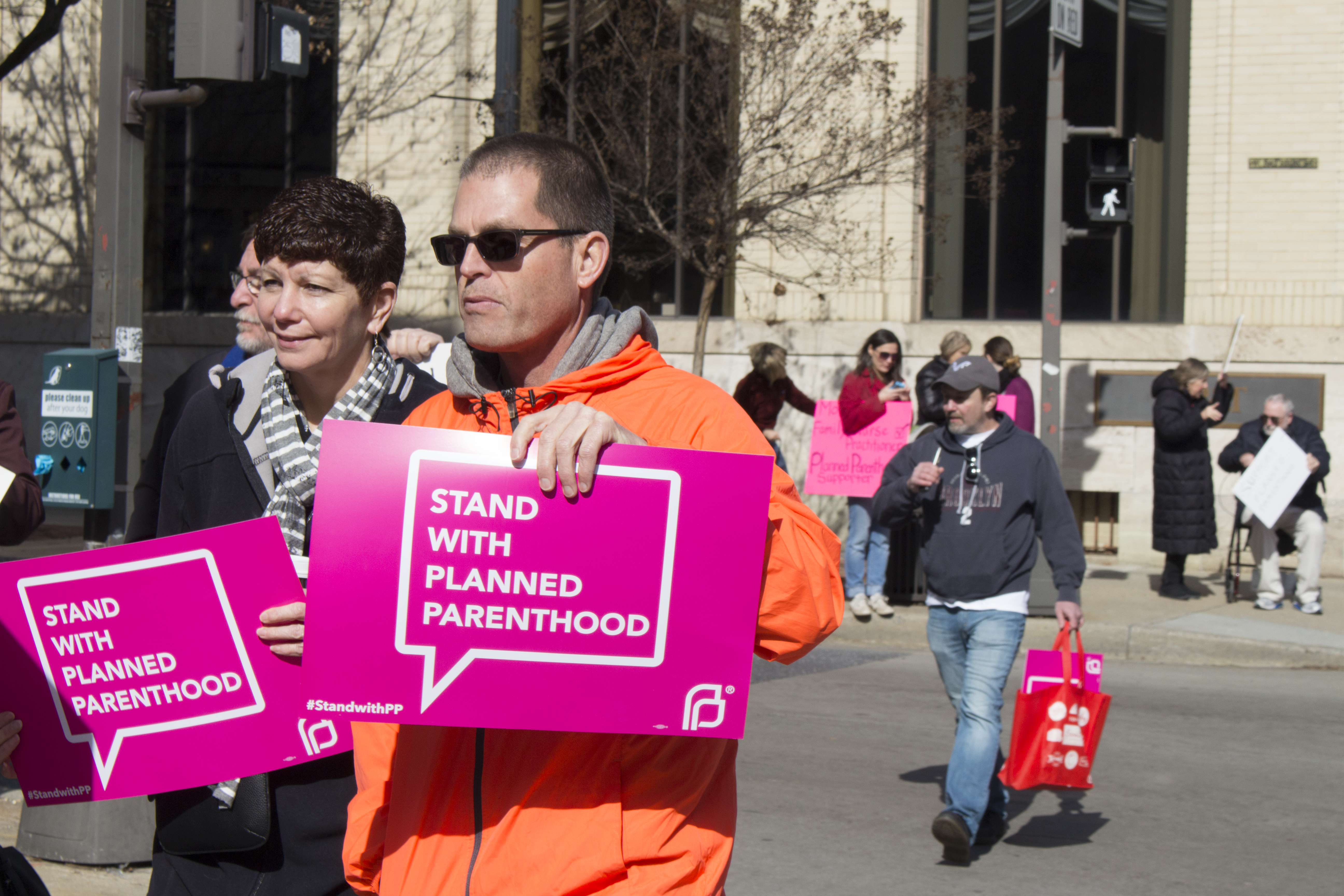
In addition to federal funding, Planned Parenthood receives 24 percent of its funding through non-governmental health services revenue, 27 percent through private contributions and bequests, and 6 percent through other sources, according to its most recent annual report.
The goal of the Frederick Stand with Planned Parenthood march was to “stand in vigil, chant, mingle, or march/walk around—peacefully and without blocking foot/vehicle traffic,” head organizers noted via Facebook.
“As more supporters arrive, we will spread out in all directions, lining the streets of our city with messages of support and solidarity and our peaceful, powerful presence,” they added.
For some Frederick folks, this event marked the first time engaging in political activism. Other attendees stated Saturday’s rally was just one of many political acts over the course of a lifetime.
Some attendees had deeply personal reasons for participating in the rally.
“I was a college student and needed emergency contraception, back before the morning after pill was sold over the counter,” said Apple Reese, a Pennsylvania native who moved to Frederick part-time in 2000. “I was scared to enter the [Planned Parenthood] building because it was surrounded by caution tape, and there were pro-life protesters and police outside.”
Once inside, Reese learned that the caution tape and police presence had been due to a bomb threat.
Participant Theresa Posthuma, Frederick resident of over 20 years, got her start as an activist as the mother of a deaf son.
She marched through the streets of Dakar, Senegal, for educational rights for deaf children as part of a volunteer group from Maryland School for the Deaf. Posthuma said she has been involved with several smaller events and organizations through the years, the largest of which was the Women’s March on Washington in January.
Though passionate about multiple causes, including education, health care, the rights of women, LGBTQ individuals, and people with disabilities, Posthuma stated that all of these passions fall beneath the overarching theme of equality, which is what motivated her to attend that Saturday.
“I am very lucky to be where I am in my life,” she added. “There are many others who are not as lucky and it is important to realize that, and to support others who are disenfranchised or are facing hardships.”
According to Posthuma, the goal of the rally on Saturday was to have her voice and the voices of others heard and to communicate, “nevertheless, we persist.”
She felt that the rally was successful in accomplishing those aims.
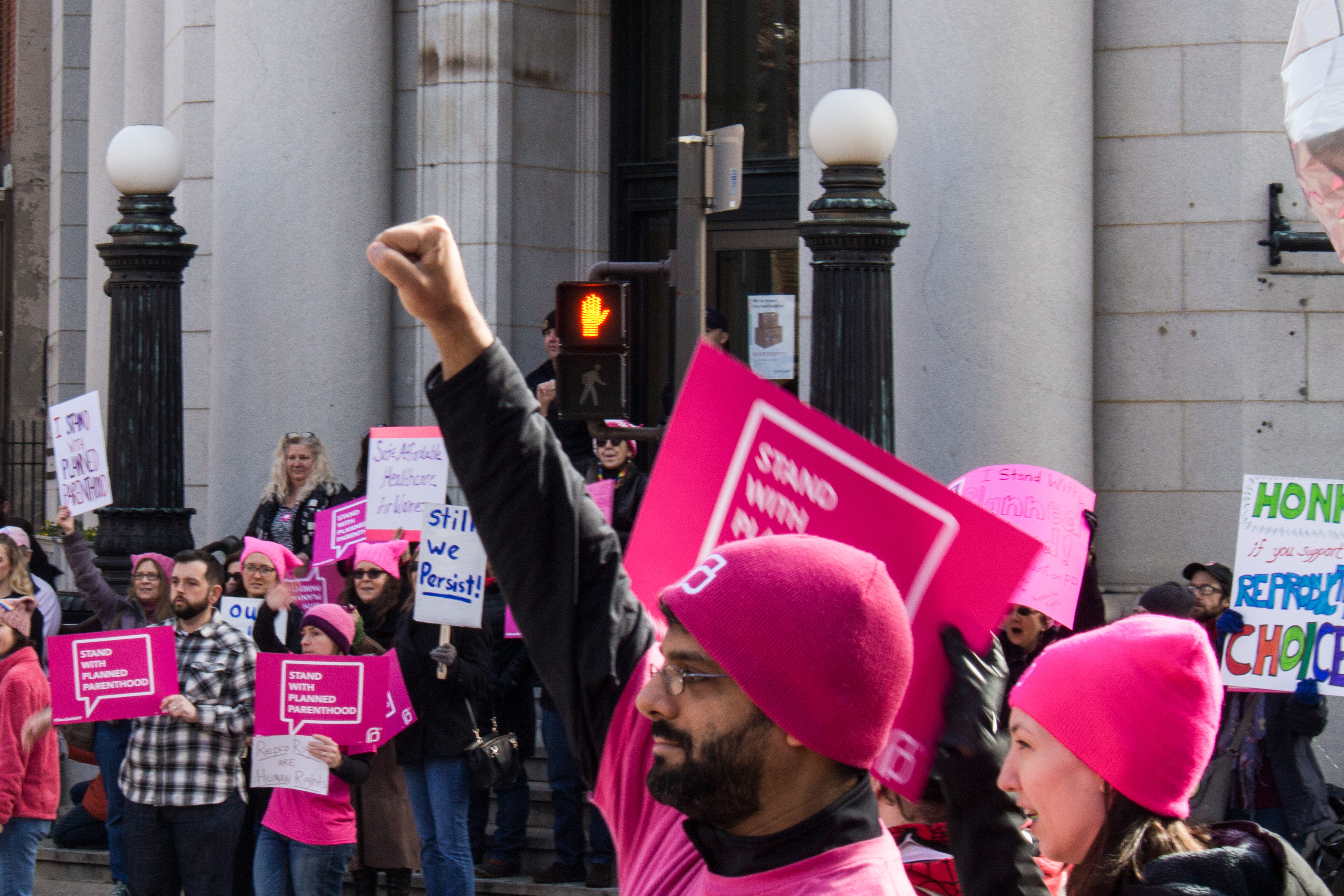
Attendee Elin Ross, Frederick resident of 15 years, identified as an activist “in the sense that much of my career has been influenced by the ideas and ideals of social justice, civic education and civil disobedience.”
February 11 wasn’t Ross’ first time engaging in political activism. She has attended protests, spoken on platforms, written letters and “seen firsthand the sheer frustration, ruin and dysfunction that compels many of us to finally participate, violently or nonviolently.”
Ross attended the rally on Saturday in a spirit of support for women and women’s issues, she said.
“My biggest concern with the efforts to dismantle Planned Parenthood are about control, not just of women’s bodies but of our sense of ourselves,” Ross said. “It’s difficult to explain that to even the most enlightened man sometimes, because they don’t experience the constant stream of ‘honeys,’ or, ‘you just don’t get it,’ or, ‘what did you expect (for walking down a sidewalk or living your life)?’ I’m no more enlightened than anyone else but, like everyone else, I owe it to my community to exercise my mind and my voice and my intellect to thoughtfully reject divisiveness…so I went, held a sign and tried to be supportive.”
As for the success of the weekend’s rally, however, Ross remained unsure.
“I question the efficacy of rallies, mass mailings and phone calls because most of the people being targeted do not represent us and clearly have no intention of doing so, and we all have short attention spans anyhow,” Ross said. “Classic civil disobedience is disruptive and powerful and gets to the heart which I think is largely economic.”
Kate Fisher of Westminster, a self-identified strong advocate for women’s health, attended the Frederick rally despite living in Carroll County. Her passions are human rights and social justice, she said.
“Planned Parenthood is in jeopardy of losing federal funding which would be devastating to our nation,” she said. “Planned Parenthood is about health screenings, preventative services, sexual education, community outreach and overall reproductive health.”
Fisher felt the rally was successful in the sense that it helped generate awareness and solicit support, but said much more must be done.
“We have to continue to reach out to our federal senators and representatives to express we want Planned Parenthood funded and we also need to reach out to our state senators and delegates to express that we want the state to fund Planned Parenthood Maryland if the Feds won’t,” she said.
Like Posthuma, Fisher described her goal as equality.
“I deserve safe access to reproductive health services and so does every other woman, regardless of income level or insurance status,” she said.
